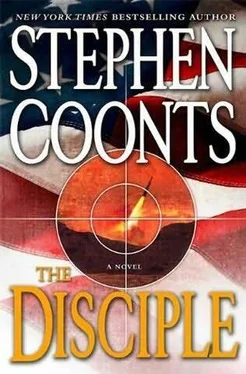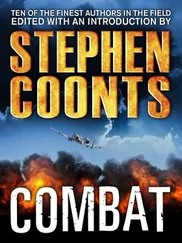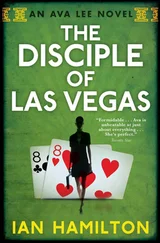Stephen Coonts - The Disciple
Здесь есть возможность читать онлайн «Stephen Coonts - The Disciple» весь текст электронной книги совершенно бесплатно (целиком полную версию без сокращений). В некоторых случаях можно слушать аудио, скачать через торрент в формате fb2 и присутствует краткое содержание. Жанр: Триллер, на английском языке. Описание произведения, (предисловие) а так же отзывы посетителей доступны на портале библиотеки ЛибКат.
- Название:The Disciple
- Автор:
- Жанр:
- Год:неизвестен
- ISBN:нет данных
- Рейтинг книги:4 / 5. Голосов: 1
-
Избранное:Добавить в избранное
- Отзывы:
-
Ваша оценка:
- 80
- 1
- 2
- 3
- 4
- 5
The Disciple: краткое содержание, описание и аннотация
Предлагаем к чтению аннотацию, описание, краткое содержание или предисловие (зависит от того, что написал сам автор книги «The Disciple»). Если вы не нашли необходимую информацию о книге — напишите в комментариях, мы постараемся отыскать её.
The Disciple — читать онлайн бесплатно полную книгу (весь текст) целиком
Ниже представлен текст книги, разбитый по страницам. Система сохранения места последней прочитанной страницы, позволяет с удобством читать онлайн бесплатно книгу «The Disciple», без необходимости каждый раз заново искать на чём Вы остановились. Поставьте закладку, и сможете в любой момент перейти на страницу, на которой закончили чтение.
Интервал:
Закладка:
“We don’t protect the processing facility,” Ahmadinejad said. The processing facility was the place where enriched uranium was refined into weapons-grade plutonium.
Sultani cocked his head. “The decision was made several years ago to disguise that facility, to keep it hidden. If the enemy doesn’t know where to find it, it will be safe.”
“If they don’t know.”
“Yes, sir.”
“What if they do know?”
“Then they could attack it with commandos or with an air raid.”
Mahmoud Ahmadinejad tapped his fingernails on the table as he mulled the problem. “The Americans could bomb the reactor today with a B-1 stealth bomber, and we wouldn’t see the aircraft on radar, isn’t that correct?”
“It is,” Sultani acknowledged.
“So the only airplanes the technology protects are conventional airplanes, such as those flown by the Israelis, who don’t have stealth bombers.”
Sultani nodded.
“To preserve the peace, the Americans would send the Israelis to do their dirty work.” The expression on Ahmadinejad’s face was not benign. “We must learn the Americans’ secret.”
Sultani nodded again. “Our best hope is the Russians. They have an extensive intelligence network in America. They will buy or steal the secrets and pass them to us.”
“The Russians,” Ahmadinejad said with a sneer. “They are as bad as the Americans. Infidels, criminals, assassins, cheats… They have wanted access to a warm ocean for four centuries and would do anything necessary to get it. They would topple this government and enslave the Iranian people if they could. Don’t ever forget that.”
He rapped once on the table, then continued. “We need to know how to see American and Israeli planes so that we can defend ourselves. Iran must protect itself from its enemies. The events last night proved that beyond any doubt.”
The president of Iran took a deep breath and exhaled. “Get that technology any way you can.”
They discussed other matters for a few moments. When they finished, as the president gathered up his papers, Sultani asked, “Have you ever wondered if we are on the winning side?”
“We are on God’s side,” Ahmadinejad declared. “The Devil has arrayed his forces against us, but the way to Paradise is always there, always open for us. All we need is the courage to fight God’s battles.”
As he rode back to the Defense Ministry, Habib Sultani reflected on Ahmadinejad’s last comment. The president was not a man given to speaking in metaphors. The way to Paradise? What way was he referring to?
Despite the heat, Sultani felt a sudden chill.
Herman Strader stood in front of the huge covered bazaar in central Tehran and looked around without enthusiasm. Beside him his wife, Suzanne, was haggling with a bearded man with a huge nose over the purchase of a leather handbag.
Herman, a building contractor back home in Bridgeport, Connecticut, had been eyeing the buildings around town ever since he and his wife arrived with the tour group three days ago. Half the town looked as if it had been ruthlessly demolished during the last thirty years and rebuilt by graduates of the Joseph Stalin School of Architecture. Wretched blocks of apartments, hideous office buildings… it wasn’t a pretty picture. Unfortunately, the old half of the city, still standing, wasn’t much better.
Oh well, Herman reflected as he reached for a cigar, then remembered where he was, Suzanne was having fun. Of all the places on the planet they could have gone on vacation, she had opted for a church group tour of this third-world bunghole. Herman eyed the lady now. Having a wife who got religion late in life was not easy, and Herman felt a little sorry for himself. Hell, they could be vacationing on the French Riviera, or touring Greece, or eating their way down the boot of Italy, but the churchies voted for mysterious, romantic Persia.
Herman Strader sighed and pulled a map of the city from his hip pocket. He and Suzanne had slipped away from the rest of the thumpers for a few hours of walking, and now he was ready to make a beeline back to the hotel.
Suzanne was in the final stages of negotiations for that purse as Herman unfolded the map, then turned it around because he thought he had it upside down. He decided he had it right the first time. He turned it around again and began studying the squiggles and lines.
In the afternoons when he finished his work at the mapmakers, Mustafa Abtahi liked to walk the streets of Tehran. After his hours at the drawing board, he thought the geometry of the streets had a certain beauty. His employer had a map of New York City, and when he had a few minutes, he liked to study it, comparing it to the hodgepodge of streets that formed this ancient city. New York was much newer, of course-thousands of years newer. It would be so wonderful to actually see it, to walk the streets, to hear all the languages spoken around him, to see the beautiful women and tall buildings and smell the smells…
Dreaming these thoughts, he almost bumped into a couple standing on a street corner. As he started to apologize, he saw that they were studying a map. A map of Tehran. One of his maps.
Now he took them in. Western dress, a couple in their fifties, perhaps, a man with a plain, strong face and a striking woman. Not beautiful, but with a strong, clear face, a face to match the man’s. They were a nice couple. Now they smiled at him and said something in a strange language.
He started to speak, tried to understand.
The realization struck him with the impact of a fist. They were speaking English! This was an opportunity to try out his English, which he had acquired three years ago during a monthlong visit by his brother who lived in New Jersey.
“I am Mustafa Abtahi,” he said, the first two words in English.
He said it so fast his listeners looked blank. He said it again, slowly, and when he saw no comprehension moved right along. “Where you from?”
Now they understood. The light in their faces was wondrous to behold. “America,” they said in unison. Then they smiled.
“I will be an American,” declared Mustafa Abtahi with joy in his heart. “When my visa comes. I take the plane. Fly.” Their faces looked puzzled. “Fly,” Abtahi shouted and stuck his arms out and pretended to be an airplane.
Herman Strader looked at the medium-sized, swarthy, bearded man with an unruly head of black hair spouting barely recognizable English and waving his arms and wondered if this was one of those fundamentalist throat-slitters he had been warned about back in Bridgeport.
Iran, birthplace of taxi drivers! Of all the places on God’s green earth-
Suzanne chattered with the man-she could actually understand his gibberish-and huddled with him over the map.
They finished with the map, and Suzanne listened intently to the maniac. “His name is Mustafa Abtahi,” she reported. More gibberish. “He is awaiting his visa to America.” Blah, blah, blah. “He has a brother in New Jersey. Hoboken.”
She jabbered a while with Mustafa, then finally turned to her husband. “I need a pen and some paper.”
“What on earth for?” Herman Strader asked his wife.
“I am getting his address. I want to send him some English-language instructional tapes.”
Herman knew better than to argue. He gave his wife one of his business cards and a pen. She started to write on one, then realized she had two. She gave one to the Iranian as her husband watched in horror.
God Almighty-they were going to have terrorist cells turning up at their door asking for donations!
Suzanne talked all the time she worked on getting the Iranian’s address. She gave him a warm smile and returned Herman’s pen.
Читать дальшеИнтервал:
Закладка:
Похожие книги на «The Disciple»
Представляем Вашему вниманию похожие книги на «The Disciple» списком для выбора. Мы отобрали схожую по названию и смыслу литературу в надежде предоставить читателям больше вариантов отыскать новые, интересные, ещё непрочитанные произведения.
Обсуждение, отзывы о книге «The Disciple» и просто собственные мнения читателей. Оставьте ваши комментарии, напишите, что Вы думаете о произведении, его смысле или главных героях. Укажите что конкретно понравилось, а что нет, и почему Вы так считаете.












